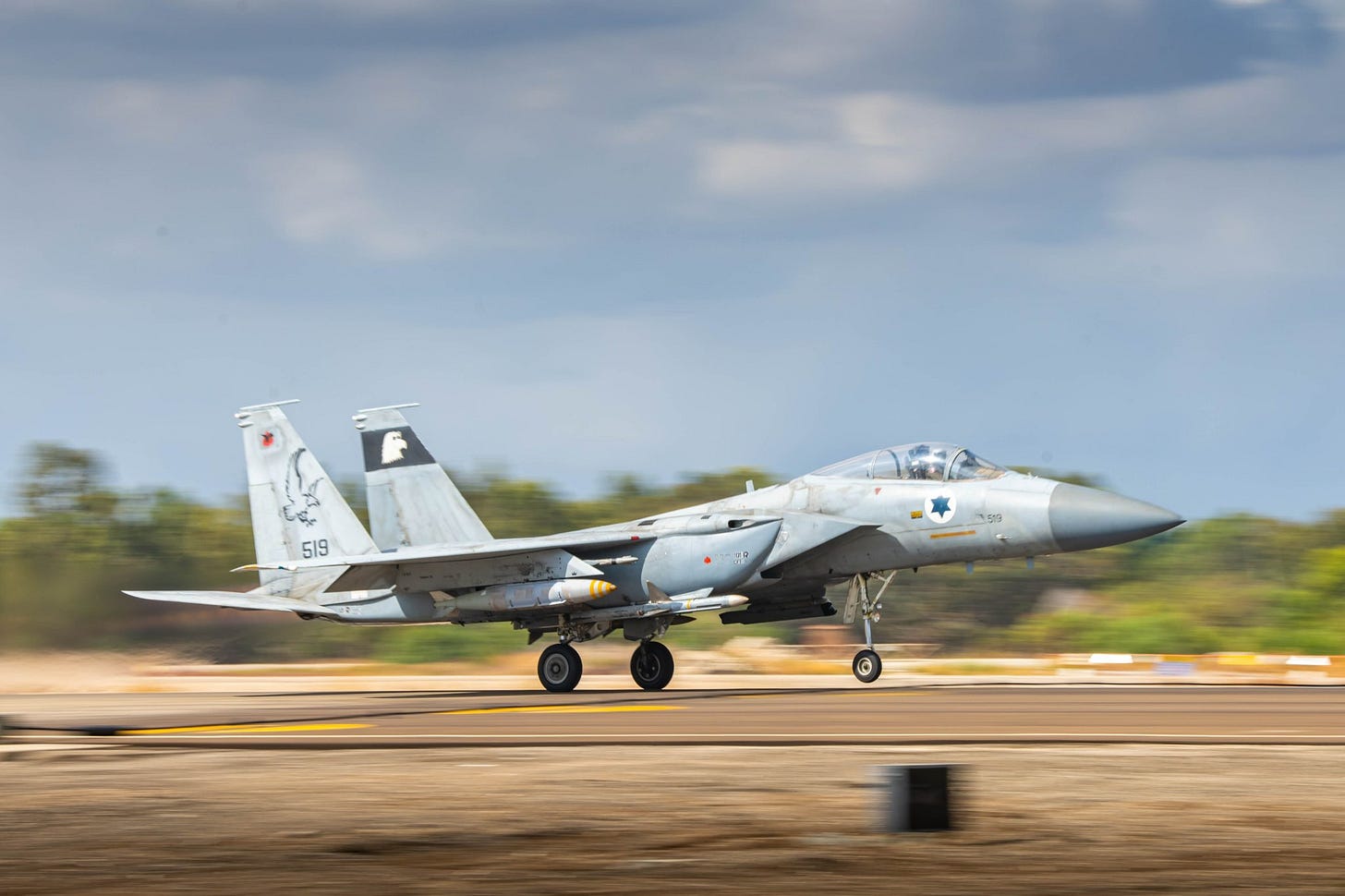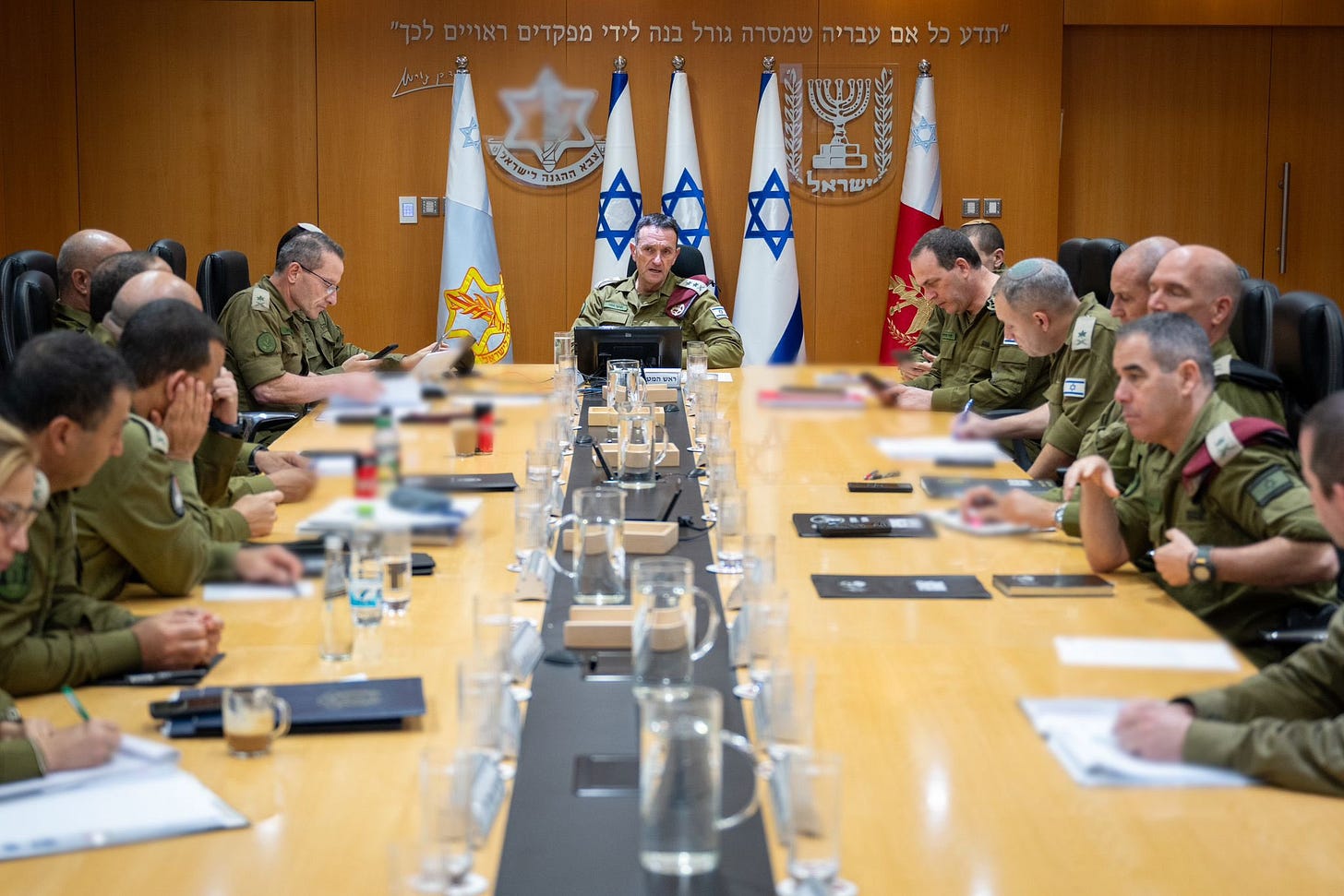No, there will not be a regional war in the Middle East.
Iran and Qatar (and the Jihadist proxies they support across the Middle East and North Africa) understand something: An all-out war against Israel will doom them to the dustbins of history.
Please consider supporting our mission to help everyone better understand and become smarter about the Jewish world. A gift of any amount helps keep our platform free of advertising and accessible to all.
You can also listen to the podcast version of this essay on Apple Podcasts, YouTube Music, YouTube, and Spotify.
By now you know about the unprecedented pager and walkie-talkie attacks that Israel allegedly launched last week against Hezbollah in Lebanon and Syria.
The timing of this operation, which wounded around 4,000 Hezbollah operatives, was carefully planned, even though some reports indicated that the device explosion sabotage capability was at a “use it or lose it” moment.1
Each of the pagers and walkie-talkies that exploded on their Hezbollah owners across Lebanon and Syria was individually detonated, with the attackers knowing who was being targeted, where he was, and whether others were in close proximity, Israel’s Channel 12 reported. In a lengthy report quoting Israeli and foreign sources, the TV channel said those behind the attack were determined to ensure that only the person carrying the pager would be hurt by the blast.
“Each pager had its own arrangements. That’s how it was possible to control who was hit and who wasn’t,” it quoted an unnamed foreign security source saying, adding: “They knew who he was with and where he was, so that the vegetable seller in the supermarket would not be hurt” when a pager exploded on a man alongside him. This is a reference to footage from the pager explosions in which a man is apparently blown up by his pager next to a fruit and vegetable stand.
A senior Iranian official even said that Tehran was involved in purchasing the pagers held by Hezbollah operatives — hinting that such a device could have been responsible for the helicopter crash that killed Iranian president Ebrahim Raisi in May.2 Iran’s official investigation into the crash determined that it was caused by “bad weather” after the helicopter carrying Raisi, Iran’s then-foreign minister, and others came down on a fog-shrouded mountainside in northern Iran.
Back to the events of last week: Without beepers and cell phones to communicate, Hezbollah Radwan special forces commander Ibrahim Aqil and approximately 20 of his top sub-commanders suddenly needed to meet in person to develop retaliation plans. Aqil was the head of Hezbollah’s military operations, the acting commander of the Radwan Force, and the head of a long-gestating plan to invade the Galilee in Israel.
When they did meet in person on Friday, the IDF killed Aqil and somewhere between 13 and 15 other critical sub-commanders in an airstrike. Thursday through Sunday, the IDF carried out four major waves of attacks, wearing down Hezbollah’s rocket launcher inventory by destroying more than 500 rocket launchers and many thousands of rockets.
In response, some 85 rockets were launched by Hezbollah from Lebanon at the Haifa area in northern Israel on Sunday morning, following overnight launches of more than 20 more rockets at the Jezreel Valley — some 50 kilometers (31 miles) south of the border with Lebanon, the terror group’s deepest rocket fire into Israel since the start of the Israel-Hamas war last October.
Late Sunday evening in Israel, the security assessment is that Hezbollah will try to reach areas even deeper into Israel, after the terror group fired rockets earlier this morning at the Haifa and Jezreel Valley areas, according to a Channel 12 news report, noting that some 1.5 million Israelis are now in Hezbollah’s line of fire.
Traffic was backed up on the tree-lined street outside Elisha Hospital in Haifa on Sunday morning. The congestion was the result of too many patients — not trying to enter the hospital, but rather trying to leave it. All elective surgeries and outpatient clinics at the facility had been canceled amid rocket barrages from Hezbollah, as hospitals across northern Israel were instructed to transfer their operations to facilities with extra protection from attacks, including relocating patients underground.
The first patients transferred underground were those in the intensive care unit. Some were transmitted by inhalation. A large team at one hospital was assisted by IDF soldiers from the Navy who were recruited for the mission.
The hospitals in northern Israel have been preparing for an escalation with Hezbollah in recent months and, among other things, have prepared for a “deserted island” scenario — that is, operating independently and cut off from supplies and even electricity. As part of this, they went out of their way to accumulate extra blood donations and medicine doses.
Israel’s Home Front Command also instructed all educational institutions in the Golan Heights, Galilee, Haifa bay area, and northern valleys to be closed on Sunday and Monday.
Meanwhile, the United Nations special coordinator for Lebanon warned yesterday on X of an “imminent catastrophe” in the Middle East amid spiking violence between Israel and Hezbollah, saying a military solution was not the answer.
This is bogus, but nonetheless unsurprising coming from the corrupted and morally depleted UN. What she was really trying to say is that Israel should not be allowed to take the fight to Hezbollah, which has hijacked Lebanon with much of the failing state’s complicity and joined the Israel-Hamas war (which Hamas started) just 24 hours after the Hamas-led massacres and kidnappings in Israel on October 7th.
If Lebanon wants to restore itself to any sense of sovereign integrity and a halfway-decent future, it should welcome Israel’s actions during the past week with open arms. Hezbollah is the daughter of the Islamic Republic of Iran, the chief destabilizer in the Middle East alongside Qatar — whereas Israel has long represented a new era for the region, one rooted in democracy, rule of law, pluralism, technology, and socioeconomic growth.
It is no coincidence that all the countries which have made peace with Israel — Egypt, Jordan, Bahrain, the United Arab Emirates, Morocco, and (secretly) Saudi Arabia — have moderated themselves in the face of Muslim Brotherhood-driven Islamism. They keenly understand that Islamism (extreme Islam) is of utmost detriment to the Middle East, even as much of the world has been brainwashed into thinking that Israel is the prime impetus for the region’s volatility and turmoil.
Iran and Qatar — and the Jihadist proxies they support across the Middle East and North Africa — even amidst all their anti-Israel public posturing, also understand something: An all-out war against Israel will doom them to the dustbins of history. This is because tiny Israel, with no real natural resources and a one-time atrocious economy with debilitating inflation as recently as the early 2000s, easily boasts not just the region’s but the world’s greatest military, security, and intelligence pound-for-pound.
There is a reason why Iran has still not retaliated for Israel’s assassination of Hamas leader Ismail Haniyeh at the end of July while he was sleeping in a Tehran building believed to be totally beyond the reach of his adversaries, what the Iranian regime considered its “safest” area.
And there is a reason why Hezbollah chief Hassan Nasrallah very carefully chose his words in a speech given late last week following the pager and walkie-talkie attacks. Nasrallah vowed a “reckoning” but was scant on the details — because Hezbollah is reeling. The first sign was the absence of a public gathering — typically consisting of high-level party officials and supporters — to watch the terror group’s leader deliver his televised speech.
The second sign is that Nasrallah’s address was likely pre-recorded. He has not given a speech in person since the start of Lebanon’s last all-out war with Israel in 2006. But Nasrallah often makes a point of proving that his broadcasts are being broadcast live. In his speech last month, for example, he referenced two sonic booms caused by Israeli jets that had broken the sound barrier over Beirut. These happened in the seconds leading up to the start of his address.
Thursday’s speech was billed as a live broadcast, but viewers were given reason to doubt that around 20 minutes in, when Israel dropped flares over the Lebanese capital and sent windows shaking with a fresh wave of sonic booms. The roar reverberated throughout the city, yet the Beirut-based Nasrallah neither flinched nor referenced the incident during his speech.

Israel’s more noticeably dramatic operations against Hezbollah during the past week sent a message that the Jewish state has decided to “take the gloves off” in its engagements with the Lebanon-based terrorist organization, according to Lieutenant Colonel (reserve) Yaron Buskila.3 He added:
“Part of the decision is that there is no intention to continue playing this symmetric game that Israel has been playing with Hezbollah so far, and Israel understands that Hezbollah can respond significantly. For Israel, there is readiness for war, and the center of gravity is shifting to northern Israel.”
“The IDF has decided that the Northern Command will become the main arena, while Gaza will become secondary. This is not just an empty statement; it’s a real, significant one, saying we are entering a campaign, even if it means entering a much tougher war.”
But even if northern Israel becomes “the main arena,” the Gaza war is still very much in mind and heart, including the remaining 100 or so Israeli hostages, about half of whom appear to be alive.4
Addressing a closed session of Israel’s Foreign Affairs and Defense Committee on Sunday, Prime Minister Benjamin Netanyahu stated that Hamas does not currently want a ceasefire deal — which was also corroborated today by White House National Security spokesman John Kirby.5 Netanyahu argued that putting pressure on Hezbollah could help force Hamas leader Yahya Sinwar to the table, Israel’s Channel 12 reported.
In Hebrew, this is known as “hafuch al hafuch” — a popular saying amongst Israelis, directly translating to “opposite on opposite.” It essentially means “upside-down logic.”
In other words, whereas much of the world sees Israel’s extensively increased operations against Hezbollah as an escalation, it appears that the Israelis understand such measures could very well lead to a deescalation, including a hostages-for-ceasefire deal which has been elusive for almost a year.
After all, Jihadists relish in death and destruction, not in diplomacy.
“Hezbollah beeper blasts: Timing not due to plan being exposed, sources say - exclusive.” The Jerusalem Post.
“Report: Senior Iranian official says Hezbollah pager could have caused helicopter crash that killed Raisi.” The Times of Israel.
“‘The gloves are off’: Beirut strike signals end of symmetry with Hezbollah, expert says.” The Jerusalem Post.
“Report: Netanyahu told MKs half of the hostages held by Hamas in Gaza are alive.” The Times of Israel.
“White House: Sinwar isn’t ‘negotiating in good faith,’ especially after murder of six hostages ‘execution style’.” The Times of Israel.



The Israeli leadership has finally re-learned a valuable lesson the US and the entire Western world has forgotten, to bring about peace make sure the enemy understands you are prepared for war.
Let’s hope the logic and the information in this segment of Future of Jewish is accurate. There is so much information out there that is hard for those of us not living in Israel to get a clear picture what’s going on. But, we hope Joshua Hoffman is right with this assessment.